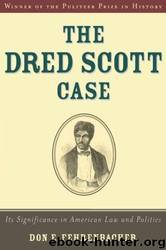The Dred Scott Case: Its Significance in American Law and Politics by Don E. Fehrenbacher

Author:Don E. Fehrenbacher
Language: eng
Format: mobi
Published: 2008-09-03T22:45:00+00:00
There are still other features of Nelson's opinion that betray his proslavery bias. Responding to the assertion that earlier decisions of the Missouri supreme court lent consistent support to Dred Scott's cause, he had declared that the later decisions (beginning with Scott v. Emerson) took precedence and were now authoritative.8 Not satisfied to leave it at that, however, he then proceeded to muddy his argument by maintaining that there was "no discrepancy between the earlier and the present cases upon this subject." But how could there be "no discrepancy" when the earlier Missouri cases-eight of them-had all been decided in favor of the slave? Because, said Nelson, most of those cases had involved removal to a free state "with it view to permanent residence," and Dred Scott's did not. What this amounted to was shifting the ground of his opinion by endorsing and emphasizing the old argument of defense counsel that Emerson, as an army officer, had never been other than a temporary resident in Illinois and the federal territory.
Nelson, however, could not just ignore the embarrassing precedent of Rachel v. Walker, in which the Missouri supreme court had freed a slave held, like Dred Scott, in free territory by an army officer. After first categorically denying am l discrepancy between the earlier and later cases, lie then had to admit that the Rachel decision constituted a major exception, having been "departed from in the case before us." But, he continued, the later Missouri decisions (especially Scott v. Emerson) were "in conformity with those in all the slave states bordering on the free," also with Story's Conflict of Laws and with the British case of The Slave Grace.9 With this change of direction, Nelson was well launched into a display of the art of begging the question. He had presumably set out to argue that Dred Scott's case was different from those eight Missouri precedents because it involved temporary rather than permanent residence on free soil. The critical question, then, was whether army service over an extended period at a single post constituted temporary or permanent residence. Faced, however, with the fact that the one relevant Missouri decision ran counter to his own judgment, Nelson dropped the matter as abruptly as he had taken it up and began to quote authorities that supported his views on comity rather than on the army service question. Then, very near the end of his opinion, he returned to the subject of residence and, without the slightest reference to the Rachel case, declared:
Download
This site does not store any files on its server. We only index and link to content provided by other sites. Please contact the content providers to delete copyright contents if any and email us, we'll remove relevant links or contents immediately.
Day by Elie Wiesel(2243)
The Age of Genius by A. C. Grayling(2174)
Gideon's Spies: The Secret History of the Mossad by Gordon Thomas(1951)
The Gulag Archipelago (Vintage Classics) by Aleksandr Solzhenitsyn(1725)
FATWA: Hunted in America by Pamela Geller(1720)
Columbine by Dave Cullen(1496)
Examples & Explanations: Administrative Law by William F. Funk & Richard H. Seamon(1327)
The Rule of Law by Bingham Tom(1318)
Men Explain Things to Me by Rebecca Solnit(1313)
Anatomy of Injustice by Raymond Bonner(1268)
Three Cups of Tea by Greg Mortenson(1257)
ADHD on Trial by Michael Gordon(1241)
That Every Man Be Armed by Stephen P. Halbrook(1238)
Gideon's Spies by Gordon Thomas(1214)
Palestinian Walks by Raja Shehadeh(1142)
The Source by James A. Michener(1135)
Fast Times in Palestine by Pamela Olson(1115)
Nothing to Envy by Barbara Demick(1040)
Constitutional Theory by Carl Schmitt(1035)
